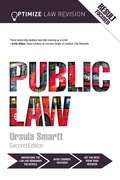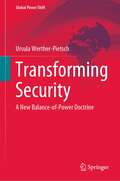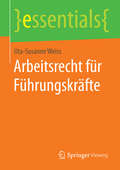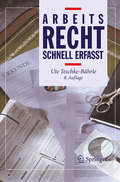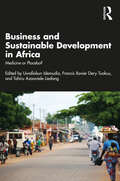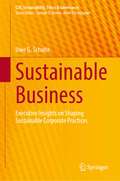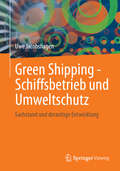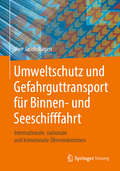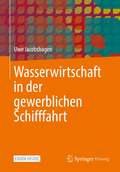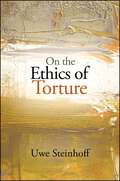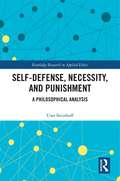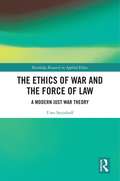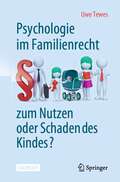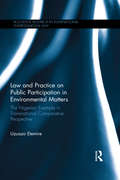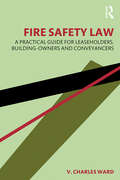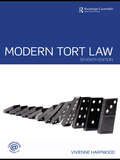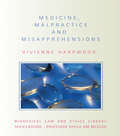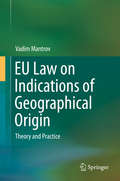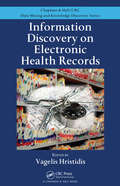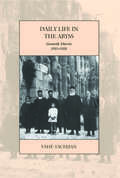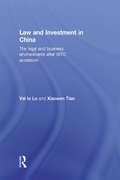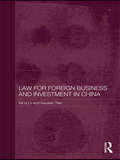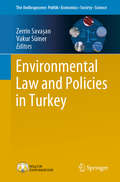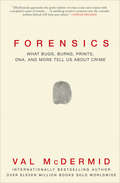- Table View
- List View
Optimize Public Law (Optimize)
by Ursula SmarttThe Optimize series is designed to show you how to apply your knowledge in assessment. These concise revision guides cover the most commonly taught topics, and provide you with the tools to: Understand the law and remember the details using diagrams and tables throughout to demonstrate how the law fits together Contextualise your knowledge identifying and explaining how to apply legal principles for important cases providing cross-references and further reading to help you aim higher in essays and exams Avoid common misunderstandings and errors identifying common pitfalls students encounter in class and in assessment Reflect critically on the law identifying contentious areas that are up for debate and on which you will need to form an opinion Apply what you have learned in assessment presenting learning objectives that reflect typical assessment criteria providing sample essay and exam questions, supported by end-of chapter feedback The series is also supported by comprehensive online resources that allow you to track your progress during the run-up to exams.
Transforming Security: A New Balance-of-Power Doctrine (Global Power Shift)
by Ursula Werther-PietschThis book analyses the collective security system as it now stands, focusing on strategic and normative frameworks. The old system of international collective security is based on assumptions that are inadequate in relation to current challenges. Against the backdrop of changed geopolitical constellations, democracies under siege and the challenges posed by new types of warfare, critical analysts hold that not a single multilateral institution today is fully up to the task it was created for. The UN, from its founding to the Sustained Peace Approach, represents a fascinating global process of vision-building and adaptation to reality. Based on this understanding, the dynamics of the UN peace and security architecture are examined along with major agendas, from peacebuilding to development. In turn, reform proposals in the post-COVID-19 era are discussed. The book examines whether a regionalization of security structures within the UN framework may offer a way out of global fragility and growing instability factors, a question of utmost importance for conflict prevention and crisis management in the next few decades. In turn, the author discusses a normative positioning of a new intervention logic as the lowest common denominator between collaborative regional orders. Reinvented multilateralism will return as a “must.” Given its scope, the book will appeal to students and scholars of international relations and international security studies, as well as to policymakers in governments and international organizations.
H2SO4 Ek Prem Kahani: H2SO4 एक प्रेम कहानी
by Usman Khanएक प्रेम कहानी के मध्य दर्द की घुसपैठ कुछ इस तरह से होती है, कि कई जिंदगानियां अपनी रवानगी खो देती हैं .'एक प्रेम कहानी जिसमे कुछ अलग नहीं था. लेकिन एक दिन सब कुछ किसी टूटे आईने जैसे बिखर जाता है. कहानी के साथ साथ किरदारों के विचारों में जो तूफानी बदलाव आता है, शायद उसको शब्दों में बांधना संभव नहीं है. 'H2SO4 एक प्रेम कहानी' नामक यह कहानी है एक 'एसिड अटैक की, जो कई जिंदगियों को बदल कर रख देती है. एक हादसा जो एक कहानी का अंत है तो दूसरी कहानी की शुरुआत. यह उपन्यास एक ऐसी लड़की की जिंदगी पर आधारित है .जो कि अपने पिता के सपनों को पूरा करने के लिए घर से बाहर निकली है. लेकिन शादी से कुछ दिन पहले हुए एसिड अटैक से उसकी जिंदगी में जैसे पल भर में सब कुछ बिखर सा जाता है. मानवीय संवेदनाओं से परिपूर्ण उपन्यास मध्यमवर्गीय समाज का बेहद सटीक ख़ाका बुनता है.
Arbeitsrecht für Führungskräfte (essentials)
by Uta-Susanne WeissUta-Susanne Weiss bietet kurz und prägnant eine Darstellung der Grundlagen des Arbeitsrechts. Fachkräftemangel und demografischer Wandel sind die Prognosen für die nächsten Jahrzehnte. Mitarbeiterbindung und Rekrutierungsprogramme werden für Unternehmen daher zunehmend wichtiger. Dabei stehen Ansprüche an Führungskräfte und Führungsverhalten auf dem Prüfstand und für sie werden daher auch arbeitsrechtliche Grundlagenkenntnisse zunehmend wichtiger - von der Anbahnung bis zur Beendigung des Arbeitsverhältnisses. Was gilt im Arbeitsverhältnis? Wer hat Mitspracherechte? Was tun im Konfliktfall? Welche Rechte und Pflichten sind bei Urlaub, Krankheit, Elternzeit usw. zu beachten? Wann und wie kommt es zur Kündigung? Fern der juristischen Weisheit ,,Es kommt darauf an. . . " erfolgt eine abstrakte Darstellung, die versucht, Praktikern die arbeitsrechtliche Welt näher zu bringen.
Arbeitsrecht - Schnell erfasst (Recht - schnell erfasst)
by Ute Teschke-BährleDie Beziehung zwischen Arbeitnehmer und Arbeitgeber ist ein Rechtsgebiet, das fast jeden betrifft. Die Autorin liefert eine knappe und pr#65533;zise Einf#65533;hrung in das Fachgebiet, bietet anhand zahlreicher Beispiele einen Einblick in die Praxis und geht auf ausgew#65533;hlte Paragrafen des Individualarbeitsrechts (mit Ausz#65533;gen aus dem BGB und dem K#65533;ndigungsschutzgesetz) und des Kollektivarbeitsrechts ein. Der Band enth#65533;lt Tipps f#65533;r Klausuren und Hausarbeiten sowie Hinweise f#65533;r die praktische Fallbearbeitung. Die 7. Auflage wurde #65533;berarbeitet und aktualisiert.
Business and Sustainable Development in Africa: Medicine or Placebo?
by Uwafiokun Idemudia, Francis Xavier Dery Tuokuu, and Tahiru Azaaviele LiedongThe book offers new critical insights into the relationship between corporate social responsibility (CSR) and sustainable development in Africa. The extent to which CSR initiatives can contribute to sustainable development in Africa remains debatable. This book examines in a very clear structure how, when, and whether CSR initiatives are able to contribute to the realization of the sustainable development goals, peace, and environmental sustainability at the micro-levels of society. It also explores some macro-level issues such as the relationship between taxation and CSR, CSR and human rights, and CSR and public governance and, in so doing, challenges existing CSR dogmas. With themes aligned with the UN Sustainable Development Goals (SDGs), this book provides useful practical guidance for policymakers and business leaders seeking to better understand the strength and limitations of CSR as a vehicle for advancing sustainable development in Africa. It will also appeal to scholars, researchers, and students of African studies, development studies, international business, strategic management, and business and society.
Sustainable Business: Executive Insights on Shaping Sustainable Corporate Practices (CSR, Sustainability, Ethics & Governance)
by Uwe G. SchulteThis book presents discussions with corporate practitioners on several topics around sustainability. Between May 2019 and November 2022, the author engaged in dialogues with Senior Executives representing major multinational corporations, overseeing their corporate sustainability endeavours. The thematic spectrum of these conversations encompassed diverse topics such as The United Nations Sustainable Development Goals, Water-stressed regions, Ocean Plastic, Chemical Recycling, Renewable Energy, Sustainable Tourism, and the Just Transition, among others, with each episode concentrating on a singular subject. In this book supporting illustrations and graphs together with background references enrich the insights the conversations convey. The reader will learn about the sustainability challenges companies are facing and how they approach them. The book gives examples of sustainable solutions and international collaborations around greenhouse gas reduction, circular economy, restorative tourism as well as reducing plastic pollution and other global sustainability challenges.
Green Shipping - Schiffsbetrieb und Umweltschutz: Sachstand und derzeitige Entwicklung
by Uwe JacobshagenKurzbeschreibung: Ergänzend zu den im Springer Vieweg-Verlag erschienen Büchern „Schiffsbetriebstechnik“ (Dr. Pfaff), „Umweltschutz und Gefahrguttransport für Binnen- und Seeschifffahrt“ (Jacobshagen) sowie „Wasserwirtschaft in der gewerblichen Schifffahrt“ (Jacobshagen) sollen die Zusammenhänge zwischen dem notwendigen Einsatz von Technik für den Schiffsbetrieb und die daraus resultierenden Einflüsse auf die Umwelt, insbesondere der Meeresumwelt, dargestellt werden. Es werden dazu die technischen Vorgänge an Bord von See- und Binnenschiffen sowie von Sportbooten beschrieben und die vorhandenen sowie entworfenen Rechtsgrundlagen erläutert. Der Einfluss der Schiffsbetriebstechnik auf den Umweltzustand soll dabei durch Statistiken, Einzelfälle und Sachverhalte erklärt werden. Besonderer Bedeutung kommt dabei der Verwendung von Betriebsstoffen zu, wobei die Arten und insbesondere Alternativen beschrieben werden sollen.
Umweltschutz und Gefahrguttransport für Binnen- und Seeschifffahrt: Internationale, nationale und kommunale Übereinkommen
by Uwe JacobshagenDas Buch fasst die Rechtsgrundlagen auf internationaler, nationaler und kommunaler Ebene auf den Gebieten Umweltschutz und Gefahrgutrecht zusammen. Es werden Rechtsanwendungen für die Praxis dargestellt und Besonderheiten kommentiert. Der Einsatz in der Lehre ist mögliche, es kann aber auch als Fachbuch gute Dienste leisten und stellt vor allem für die Praxis einen Wissensspeicher dar.
Wasserwirtschaft in der gewerblichen Schifffahrt
by Uwe JacobshagenIn der Schifffahrt spielt Wasser allenthalben eine wichtige Rolle, in der gewerblichen Schifffahrt wird Wasser auch als Brauchwasser, als Grau- und Schwarzwasser sowie zur Nutzung durch den Menschen als Trinkwasser benötigt. Diese Wasserarten, als Grundlage der Wasserwirtschaft auf gewerblich genutzten Schiffen, werden im Buch eingehend definiert. Die Eigentumsarten bzw. Eigentumsverhältnisse, als Voraussetzung für die Nutzung des Wassers, sind beschrieben und die rechtliche Befugnis, das Wasser für die Zwecke an Bord zu verwenden oder ein Gewässer durch einen Gebrauch an Bord zu verändern ist erläutert. Es hilft Schifffahrtstreibenden, Eignern sowie Verantwortlichen im öffentlichen Dienst und Juristen die sich mit der Thematik befassen, die Zusammenhänge sowie den regulatorischen Rahmen zu verstehen bzw. zu vertiefen.
On the Ethics of Torture
by Uwe SteinhoffThe question of when, and under what circumstances, the practice of torture might be justified has received a great deal of attention in the last decade in both academia and in the popular media. Many of these discussions are, however, one-sided with other perspectives either ignored or quickly dismissed with minimal argument. In On the Ethics of Torture, Uwe Steinhoff provides a complete account of the philosophical debate surrounding this highly contentious subject. Steinhoff's position is that torture is sometimes, under certain narrowly circumscribed conditions, justified, basing his argument on the right to self-defense. His position differs from that of other authors who, using other philosophical justifications, would permit torture under a wider set of conditions. After having given the reader a thorough account of the main arguments for permitting torture under certain circumstances, Steinhoff explains and addresses the many objections that have been raised to employing torture under any circumstances. This is an indispensible work for anyone interested in one of the most controversial subjects of our times.
Self-Defense, Necessity, and Punishment: A Philosophical Analysis (Routledge Research in Applied Ethics)
by Uwe SteinhoffThis book offers a philosophical analysis of the moral and legal justifications for the use of force. While the book focuses on the ethics self-defense, it also explores its relation to lesser evil justifications, public authority, the justification of punishment, and the ethics of war. Steinhoff’s account of the moral use of force covers a wide range of topics, including the nature of justification in general, the precise elements of different justifications, the logic of claim- and liberty-rights and of rights forfeiture, the value of human life and its limits, and the princples of reciprocity and precaution. While the author’s analysis is primarily philosophical, it is informed by a metaethical stance that also places heavy emphasis on existing law and legal scholarship. In doing so, the book appeals to widely shared moral intuitions, precepts, and concepts grounded in criminal law. Self-Defense, Necessity, and Punishment offers the most comprehensive and systematic account of the ethics of self-defense. It will be of interest to scholars and graduate students working in applied ethics and moral philosophy, philosophy of law, and political philosophy.
The Ethics of War and the Force of Law: A Modern Just War Theory (Routledge Research in Applied Ethics)
by Uwe SteinhoffThis book provides a thorough critical overview of the current debate on the ethics of war, as well as a modern just war theory that can give practical action-guidance by recognizing and explaining the moral force of widely accepted law. Traditionalist, Walzerian, and "revisionist" approaches have dominated contemporary debates about the classical jus ad bellum and jus in bello requirements in just war theory. In this book, Uwe Steinhoff corrects widely spread misinterpretations of these competing views and spells out the implications for the ethics of war. His approach is unique in that it complements the usual analysis in terms of self-defense with an emphasis on the importance of other justifications that are often lumped together under the heading of "lesser evil." It also draws on criminal law and legal scholarship, which has been largely ignored by just war theorists. Ultimately, Steinhoff rejects arguments in favor of "moral fundamentalism"— the view that the laws and customs of war must simply follow an immutable morality. In contrast, he argues that widely accepted laws and conventions of war are partly constitutive of the moral rules that apply in a conflict. The Ethics of War and the Force of Law will be of interest to scholars and advanced students working in just war theory, applied ethics, political philosophy, political theory, philosophy of law, and criminal and military law.
Psychologie im Familienrecht - zum Nutzen oder Schaden des Kindes?
by Uwe TewesDieses lebenspraktische Sachbuch greift die öffentliche Diskussion über Ungerechtigkeiten im Scheidungsverfahren, gerichtliche Fehlurteile und familienpsychologische Gutachter als „heimliche Richter“ auf. Es beschreibt anschaulich das sehr komplexe System der Zusammenarbeit von Gerichten, Gutachtern, Anwälten, Jugendämtern und Verfahrensbeiständen der Kinder und befasst sich insbesondere mit der Arbeit der psychologischen Sachverständigen.Mit Hinweisen auf fragwürdige Methoden und häufige Fehlerquellen regt dieses Werk auch zum Mitdenken an und ist sowohl ein Plädoyer für ein gesundes Maß an Psychologie im Familienrecht wie auch eine Warnung vor einer Psychologisierung des Gerichtsverfahrens.Zielgruppen für dieses Buch sind Eltern und Betroffene, Juristen und andere beteiligte Professionen sowie psychologische Laien mit einem Interesse an dieser Thematik.Diese vollständig überarbeitete und aktualisierte Neuauflage berücksichtigt die zahlreichen Empfehlungen, Richtlinien, Mindestanforderungen der Fachgesellschaften und der neueren Fachbücher, die seit der Erstauflage erschienen sind.Zum Autor Universitäts-Professor und Diplom-Psychologe (i.R.) Dr. Uwe Tewes war Leiter des Instituts für Medizinische Psychologie an der Medizinischen Hochschule Hannover und mehr als vier Jahrzehnte nebenamtlich als forensischer Gutachter tätig.
Law and Practice on Public Participation in Environmental Matters: The Nigerian Example in Transnational Comparative Perspective (Routledge Research in International Environmental Law)
by Uzuazo EtemirePublic participation has become a recurring theme and a topical issue in the field of international environmental law, with many multilateral environmental instruments calling on states to guarantee effectively the concept in their laws and practices. This book focuses on public participation in environmental governance, in terms of public access to environmental information and public participation in environmental decision-making processes. Drawing on the body of international best practice principles in environmental law and taking a comparative stance, Uzuazo Etemire takes Nigeria as a key case, evaluating its procedural laws and practices in relation to public access to information and participation in decision-making in environmental matters. In working to clarify and deepen understanding of the current status of environmental public participation rights in Nigeria, the book addresses key issues in environmental governance for developing and transitional countries and the potential for public participation to improve the state of the environment and public wellbeing. This book will be of great interest to undergraduate students (as further reading) and post-graduate students, academics, researchers, relevant government agencies and departments, policy-makers and NGOs in the fields of international environmental law, environmental justice, environmental/natural resource management, development studies and international finance.
Fire Safety Law: A Practical Guide for Leaseholders, Building-Owners and Conveyancers
by V. Charles WardFire Safety Law provides building-owners, managers, individual leaseholders, mortgage-lenders, landlords, and anyone involved in the purchase or sale of a flat situated within a multi-occupied block, with practical, yet comprehensive and well-researched information regarding the subject of fire safety and the associated responsibilities, obligations and rights. V. Charles Ward addresses in practical legal terms the responsibilities on building-owners to ensure that buildings are fire-safe for people who are living, working, or visiting those buildings and explains what protections are available to leaseholders faced with the costs of making their buildings fire-safe. The book begins with a summary of the lessons which have come from the Grenfell Inquiry, before providing a practical overview of current fire-safety legislation relating to residential and commercial buildings. This legislative overview will include not only the 2005 Fire Safety Order, as updated by the 2021 Fire Safety Act and the Fire Safety (England) Regulations 2022, but will also include associated and emerging legislation and official guidance in relation to fire safety, including gas and electrical safety regulation, as well as the Building Safety Act 2022. The book will then pull apart a typical long-residential lease within a high-rise block to identify who is directly responsible for fire safety and explain how the costs of making good the fire-risk from defective cladding might be shared out between the ground-landlord and individual residential leaseholders. Having assessed the legal situation as regards existing high-rise leaseholders, the book then addresses the additional ‘due diligence’ required by prospective purchasers of individual high-rise flats, as well as estate agents, mortgage lenders, landlords and conveyancing lawyers, to ensure that what they will be buying or lending money on is ‘fire-safe’ and that any associated costs are fully accounted for.
Modern Tort Law
by V. H. HarpwoodModern Tort Law is a comprehensive, accessible and up-to-date introduction to the law of torts. Now in its seventh edition, Vivienne Harpwood's popular, student-friendly text explains the principles of all aspects of tort law in a lively and thought-provoking manner. The broad coverage of modern tort law makes this an ideal textbook for any undergraduate tort law course. Students are encouraged to understand and apply the principles of tort law effectively throughout and particular attention is paid to the context within which the law is evolving, making these topics both accessible and enjoyable. This seventh edition has been revised and updated to take into account developments since publication of the previous edition including in the areas of privacy, negligence, personal injury and defamation. Human Rights issues are integrated throughout the text rather than treating the topic in isolation, in line with the way the subject is commonly taught. Now more accessible and student-friendly, it includes: advice on further reading at the end of each chapter which is intended to point students towards sources of further study and critical debate new chapter introductions, rewritten to reflect learning outcomes. Modern Tort Law is now supported by a Companion Website which offers lecturer resources available to adopters of the book, including 'think points' designed to encourage reflection and debate and PowerPoints of diagrams and flowcharts contained within the text. A dedicated student section also offers weblinks, a guide to key Tort law cases, a flashcard glossary and a test bank of multiple choice questions.
Medicine, Malpractice and Misapprehensions (Biomedical Law and Ethics Library)
by V.H. HarpwoodAnalyzing the level of claims for clinical negligence in the light of the most recent trends and discovering whether there is indeed a litigation crisis in healthcare, this book is a topical and compelling exploration of healthcare and doctor-patient relationships. The author: identifies and analyzes the growing pressures on doctors in modern society, placing their role in context explores some of the myths surrounding media claims about malpractice considers the practice of ‘defensive medicine’ and the difference between defensive practices and sensible risk management examines external pressures, such as political interference with clinical practice in the form of target-setting and what might be described as a culture of creeping privatization of healthcare. Covering the topics of medicine and the media and the causes of occupational stress among doctors, this volume is a must read for all students of medical law and medical ethics.
EU Law on Indications of Geographical Origin
by Vadim MantrovThe present book examines both theoretical and practical aspects of the law on indications of geographical origin (IGOs) within the framework of European Union (EU) law, pursuing four distinct yet mutually related aims. First, it discusses theoretical issues of the law on IGOs including its historical foundations, terminology, principles of regulation, legal subjectivity, protection models and loss of protection. Second, it covers the EU law on IGOs from a systematic point of view. Particularly, the systematic review of the EU law on IGOs includes an in-depth analysis of and commentary on the relevant and applicable regulations. Third, it examines current legislative initiatives and further development options for the EU law on IGOs. Finally, it reveals the interrelation of the EU law on one hand and the national laws of EU Member States on the other with regard to IGOs, focusing on harmonized and non-harmonized areas of law.
Information Discovery on Electronic Health Records (Chapman & Hall/CRC Data Mining and Knowledge Discovery Series)
by Vagelis HristidisExploiting the rich information found in electronic health records (EHRs) can facilitate better medical research and improve the quality of medical practice. Until now, a trivial amount of research has been published on the challenges of leveraging this information. Addressing these challenges, Information Discovery on Electronic Health Records exp
Daily Life in the Abyss: Genocide Diaries, 1915-1918 (War and Genocide #25)
by Vahé TachjianHistorical research into the Armenian Genocide has grown tremendously in recent years, but much of it has focused on large-scale questions related to Ottoman policy or the scope of the killing. Consequently, surprisingly little is known about the actual experiences of the genocide’s victims. Daily Life in the Abyss illuminates this aspect through the intertwined stories of two Armenian families who endured forced relocation and deprivation in and around modern-day Syria. Through analysis of diaries and other source material, it reconstructs the rhythms of daily life within an often bleak and hostile environment, in the face of a gradually disintegrating social fabric.
Law and Investment in China: The Legal and Business Environment after China's WTO Accession
by Xiaowen Tian Vai Io LoThe Chinese market is appealing, but the Chinese legal system is very complicated. A basic understanding of Chinese law is absolutely crucial for companies investing in this fast-growing and potentially huge market. Since China is moving toward a socialist market economy and is increasingly integrated into the world market, some aspects of China's commercial law are different from, while others are moving into line with, those of mature market economies. This book provides an introduction to the Chinese legal system, focusing on laws and regulations on foreign direct investment and highlights recent government policies and measures undertaken to intensify economics reforms so as to meet various challenges arising from China's accession to the World Trade Organization.
Law for Foreign Business and Investment in China
by Xiaowen Tian Vai Io LoIn trying to establish a presence in China, foreign investors have found it imperative to understand the regulatory environment of this potentially huge market. This book provides an up-to-date overview of the legal framework for doing business in China. It covers such topics as state structure; legislative amendments and enactments on direct foreign investment; the court system; the legal profession; business entities; foreign investment enterprises; contracts; intellectual property; labor and employment; consumer protection; taxation; securities; and dispute resolution. Apart from explaining legal principles, the book highlights liberalisation measures that China has undertaken to fulfil its WTO commitments; elucidates complicated legal concepts with examples of court decisions; discusses relevant foreign trade and investment polices; and includes a glossary of Chinese terms.
Environmental Law and Policies in Turkey (The Anthropocene: Politik—Economics—Society—Science #31)
by Vakur Sümer Zerrin SavaşanThis book aims to provide a general systematic analysis of key issues of Turkish environmental law and policies and to highlight the related concerns and challenges. Its chapters provide a historical perspective and general understanding of the legal settings of Turkish Environmental Law; offer an overall understanding of the evolving and prevailing paradigms of legislation and administrative practices in environmental policy in Turkey; explain how EIA has become the main environmental management tool and instrument of environmental compliance in Turkey; discuss the project process, challenges and results of the EU-funded project ‘Turkey’s Map of Environmental Violations’ and food security in Turkey; and present a picture of environmental justice movements from bottom-up over the establishment and operation of small-scale hydroelectricity power plants.Thus, with its comprehensive coverage of up-to-date information and findings enabling the reader to understand the topic in full analyses of key themes in Turkish environmental law and policies, addressing, in separate chapters, concepts like environmental justice, food security, environmental compliance, environmental impact assessment (EIA), and environmental cases in Turkey in detail multidisciplinary approach enabling readers to learn about the topic in a holistic mannerit aims to be:• a valuable source of information about Turkish environmental law and policies• an effective tool to support teaching and research on Turkish environmental law and policies• an aid to decision-making on Turkish environmental issues• an important resource for graduate and postgraduate research students and policymakers working on Turkish environmental law and policies Given there is no competitive book on the market with similar coverage, it makes a meaningful contribution to Turkish environmental scholarship
Forensics: What Bugs, Burns, Prints, DNA, and More Tell Us About Crime
by Val McDermidVal McDermid is one of the finest crime writers we have, whose novels have captivated millions of readers worldwide with their riveting narratives of characters who solve complex crimes and confront unimaginable evil. In the course of researching her bestselling novels McDermid has become familiar with every branch of forensics, and now she uncovers the history of this science, real-world murders and the people who must solve them. The dead talk to the right listener. They can tell us all about themselves: where they came from, how they lived, how they died, and, of course, who killed them. Forensic scientists can unlock the mysteries of the past and help serve justice using the messages left by a corpse, a crime scene, or the faintest of human traces. Forensics draws on interviews with some of these top-level professionals, ground-breaking research, and McDermid’s own original interviews and firsthand experience on scene with top forensic scientists. Along the way, McDermid discovers how maggots collected from a corpse can help determine one’s time of death; how a DNA trace a millionth the size of a grain of salt can be used to convict a killer; and how a team of young Argentine scientists led by a maverick American anthropologist were able to uncover the victims of a genocide. It’s a journey that will take McDermid to war zones, fire scenes, and autopsy suites, and bring her into contact with both extraordinary bravery and wickedness, as she traces the history of forensics from its earliest beginnings to the cutting-edge science of the modern day.
